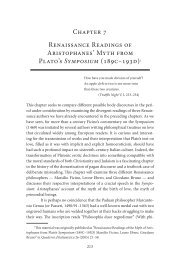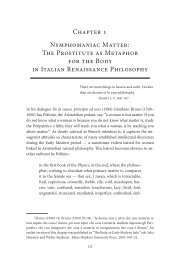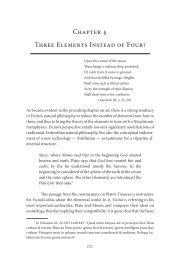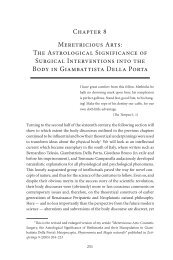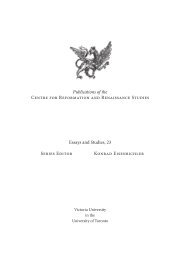Chapter 2 Matter as a Mirror: Marsilio Ficino and Renaissance ...
Chapter 2 Matter as a Mirror: Marsilio Ficino and Renaissance ...
Chapter 2 Matter as a Mirror: Marsilio Ficino and Renaissance ...
You also want an ePaper? Increase the reach of your titles
YUMPU automatically turns print PDFs into web optimized ePapers that Google loves.
<strong>Matter</strong> <strong>as</strong> a <strong>Mirror</strong> 73<br />
into female. The fear about soul’s boundaries thus harks back to the violence<br />
implicit in the Narcissistic act of creation that left no room for otherness or<br />
for the world. Ironically, it is precisely this negation that is decisive for the<br />
fate of Narcissus. According to <strong>Ficino</strong>’s readings he drowns in the pond of<br />
matter because he fails to acknowledge the reflection in the water <strong>as</strong> his own<br />
image. In the end, this is a male strategy of self-f<strong>as</strong>hioning, which not only<br />
entails a fant<strong>as</strong>y of absolute power intrinsic to that process, but at the same<br />
time betrays a deep anxiety that female matter actually will not be fully<br />
dominated. 85 Obviously the erotic, potentially uncontrollable involvement<br />
of soul with matter deeply worried <strong>Ficino</strong>, yet, paradoxically, he developed<br />
a cosmology that put particular emph<strong>as</strong>is on the domination of matter by<br />
soul by transferring the model of the Narcissistic <strong>and</strong> creative gaze to the<br />
story of divine Creation.<br />
<strong>Ficino</strong>’s Narcissistic Account of Divine Creation:<br />
<strong>Matter</strong>, Shadow, Reflection<br />
The idea of a Narcissistic gaze that orders or even creates the world is rooted in<br />
one of the most f<strong>as</strong>cinating (in the literal sense of the word) accounts of cosmogenesis<br />
to be found in <strong>Ficino</strong>. A crucial p<strong>as</strong>sage in this context is Theologia<br />
platonica, XVII, chapter 2, which promises to explain the ide<strong>as</strong> of the two l<strong>as</strong>t<br />
Platonic academies about soul. 86 <strong>Ficino</strong> sets out by stating that, according to<br />
85 These remarks are indebted to Stanley Cavell’s essay on the relationship between<br />
Othello <strong>and</strong> Desdemona in Shakespeare in Cavell (1987) 125–142. One may well wonder<br />
why I do not mention the fate of Echo. After all, Narcissus is punished because he refuses<br />
the Nymph’s love, which emph<strong>as</strong>izes his reckless attitude towards the other humans, the<br />
embodied world. I w<strong>as</strong> deliberately reluctant to include Echo here, for several re<strong>as</strong>ons (a)<br />
the gendered relationship between Narcissus <strong>and</strong> Echo again is very complex; I believe<br />
that Ovid mainly wanted to emph<strong>as</strong>ize the parallelism between the voice that is thrown<br />
back by Echo on the one h<strong>and</strong> <strong>and</strong> the image that is reflected in the pond on the other (a<br />
similar parallelism between voice <strong>and</strong> image is to be found in Aristotle, De anima 419ab;<br />
<strong>and</strong> (b) because my focus here is on the Narcissus story in the broader context of the Corpus<br />
hermeticum <strong>and</strong> in Plotinus, <strong>and</strong> (c) because Echo is not mentioned in <strong>Ficino</strong>’s account<br />
of the Narcissus story.<br />
86 Theologia XVII, 2: III, 149–151: “Plato in Parmenide [137D] quidem Deum vocat<br />
infinitum, in Philebo [16D–23C] vero nominat terminum. Infinitum scilicet, quia nullum<br />
aliunde accipit terminum, terminum autem, quia formis qu<strong>as</strong>i mensuris p<strong>as</strong>sim<br />
distributis omnia terminat. Hinc Platonici disputant, quatenus Deus tanquam infinitus<br />
omnem a se excludit terminum, eatenus ferme ex eo qu<strong>as</strong>i umbram pendere po-



